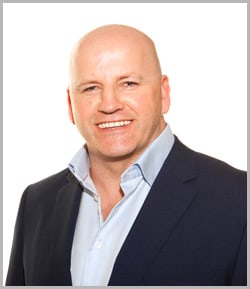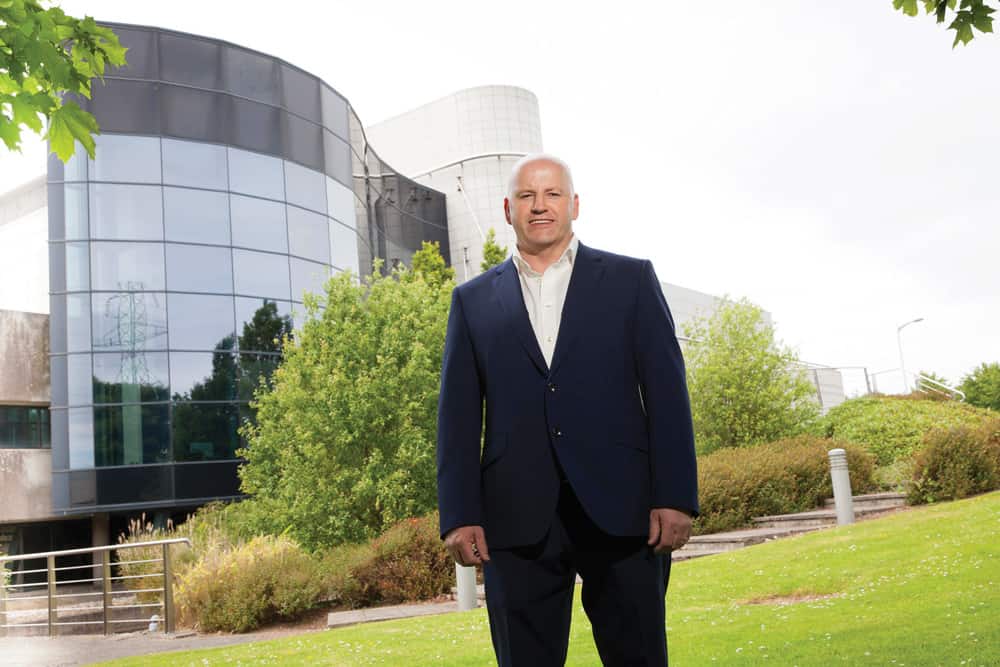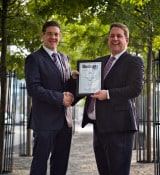Former presidential candidate and Dragon Sean Gallagher shares his thoughts on leadership, entrepreneurship – and learning lessons from one’s business peers.
Few Irish businessmen are as recognisable as Sean Gallagher, from his stint on Dragons’ Den and from the heady days of four years ago when he stood to become president of Ireland – and fell at the final hurdle.
Since then there have been regular media appearances, public speaking, a Sunday Independent column and a new chapter in his entrepreneurship story, developing commercial property.
Suffice to say, then, that he has a thought or two about leadership, entrepreneurship and the role of the CEO, in keeping with the spirit of the Business & Finance CEO 100. So what qualities are needed in Irish business leaders in this day and age?
“The first thing is to define the difference between management and leadership,” he says. “There’s a saying that goes: ‘management is about doing things right, and leadership is about doing the right thing.’ One is about managing the status quo, about delivery, about execution; and leadership is really about the strategy and positioning of the business. Maybe one is more inward-looking, in terms of management, whereas leadership is more outward-looking and forward-focused.
“The key skillsets or mindsets for a leader now would be to have an overall compelling vision of what it is you want the company or organisation to be about. So: why do we exist? What’s the purpose? What’s our driving passion or goal or objective for existing in the first instance. And usually that has to be bigger than just about achieving money and profit. It has to be about having an impact, and it’s almost always about being of service to somebody.”
The next thing is clarity, he says, citing management guru Stephen Covey and his maxim that ‘the main thing is to keep the main thing the main thing’. “What is it that we’re focused on?” asks Gallagher. “What’s the priority? You’ll be dragged in myriads of different ways, but keep focused on the priorities. I think it’s also about being an evangelist for the business or organisation, and to me that’s about enrolment and engagement. You want to be able to tell the story of the vision and you want to engage your staff on that journey. You also want to engage investors, and the public or consumers, and partners and suppliers.”
You want to be able to tell the story of the vision and you want to engage your staff on that journey
NATURE OR NURTURE?
There’s a debate on whether these things are innate or can be developed, but Gallagher leans towards the latter: some things are down to DNA, but much comes down to one’s environment. He came up through youth organisation Foróige, where he built up skills that would come in handy: leadership, public speaking, involvement in committees, getting stuck in as chairman, secretary or PRO. Furthermore, many of today’s leaders encountered role models in their youth or early career, positive influences much like being the son or daughter of a doctor, for example.
“Success, generally, is a combination of a skillset and a mindset. Skills can certainly be learned,” he says. “Many people will say you should hire for attitude and train for skills.” Action is important: small wins, building self-confidence. And not being afraid to fail is important too (“Irish people have a strange view about failure,” he says).
All of this is on his mind as he prepares to speak at the Bord Gáis Energy Leadership Conference at the Aviva Stadium in late September; a coming together of entrepreneurs, with input from sports leaders such as rugby’s Ronan O’Gara and Dublin legend Jim Gavin. The common theme is how one gets people to perform at their best, says Gallagher.
“The most important thing is that you’re bringing people together. Because entrepreneurs and leaders of SMEs are a tribe…. we need to continuously surround ourselves with people in the tribe, and learn from each other, and support each other. There’s a huge amount of sharing that happens when you get networking and entrepreneurs together.”
BACK IN THE GAME
 Gallagher’s high-profile public speaking and media punditry roles continue, but he’s also kept busy with Clyde Real Estate, a business venture co-founded along with Digiweb/Viatel entrepreneur Colm Piercy last year. What are the plans?
Gallagher’s high-profile public speaking and media punditry roles continue, but he’s also kept busy with Clyde Real Estate, a business venture co-founded along with Digiweb/Viatel entrepreneur Colm Piercy last year. What are the plans?
“We believe there to be a very strong market in the commercial real estate sector,” says Gallagher. “We’re working on office and industrial acquisitions. We’re working on the perimeter of Dublin, the suburbs of Dublin, and throughout the rest of Ireland – our strategy being that we typically go to high-population centres with good infrastructure and where there’s a third-level university or institute of technology. We have two large office facilities in Blanchardstown, which we’re bringing to the market now; we’re looking at others in Dundalk, which has an IT; Galway, Athlone, Cork, Limerick, Waterford.
“We’re not your typical property developer; we’re coming from the entrepreneurial side. Our slogan is: ‘Clyde Real Estate – creating space for business’.” IDA Ireland needs buildings for FDI, Gallagher says, and these companies don’t want to go and see a green field: they want certainty when planning a location in Ireland. “We believe there to be a gap there”.
So is the recovery real? “Yes, is the honest truth, but it isn’t everywhere yet,” he says. Retail sectors, particularly outside of the main urban areas, are struggling. He’s encouraged by a boost in confidence though, and can see signs of people spending, and businesses investing, as they feel more secure that the worst is in the past.
“Critical to the success of a company is to make sure that there’s access to cash and capital. And that has been a challenge,” he says. “SMEs can’t grow unless they can get cash to invest, so we need to see more and more of that. That’s beginning to free up; that’s an issue for the banks and I can see that it’s starting to happen.”
He also highlights the promotion of entrepreneurial culture from schools right up through the education system and wider society: in the past, professions were seen as the role model but entrepreneurs should have a “higher standing in society,” he says, because entrepreneurs create the jobs and tax revenues that build hospitals, schools and the public sector. He was unemployed twice in the 1980s, and doesn’t want that again for himself or anyone else.
STILL IN THE FRONTLINE?
Gallagher stood for president in 2011, ahead in the polls for much of the campaign before coming a distant second to Michael D Higgins, stung by late revelations over his fundraising and support for Fianna Fáil, his business record, and his performance on RTÉ’s The Frontline debate – the ‘fake tweet’ row that simmers on. So is he done with politics or can he see himself standing again at some point?
“No, I think my future is in the world of business – but not just business”: his main message in the campaign was around jobs and enterprise, “trying to do for jobs in Ireland what Mary McAleese did for the peace process,” as he says. “That was my agenda. But I come very rounded, with a holistic approach of being involved in community, in agriculture and business. So for me, I think I can make a contribution in that but I also want to be able to be out promoting and encouraging more jobs, encouraging young people, building confidence, building productivity and trying to change” – and wants to move the conversation away from what can’t be done and towards what can.
“So whether I do that in politics or in business, I hope I’m having the same impact.”
WHAT CEOs DO YOU ADMIRE IN IRELAND TODAY?
Vincent Carton
“Vincent is CEO of Manor Farm. They do about €220m turnover, they’re an eighth-generation business – which is something spectacular, to survive. They process 850,000 chickens a week in Cavan, where I come from, and they employ 850 people. That was somebody who stepped in as the eighth generation of a family business leader and has just grown it, embraced technology and new product development.”
Dave Bobbett
“Dave Bobbett is from H&K International and they do end-to-end kitchens for fast food restaurants. He led a management buyout in 2002 and lost 85% of his turnover the following month when his main customer effectively wasn’t progressing with them. He turned that company around in ten years, took over from providing new restaurants to the likes of McDonald’s, to now supplying a whole supply chain from the design through to maintenance of kitchens in fast food restaurants, and to employing 1,200 people directly, installing 20,000 kitchens around the world and a turnover of €360m. That’s real change management, facing adversity, and pivoting. He’s an inspiration.”
Simon Pratt
“Simon Pratt from Avoca is a super CEO: a family business that took a retail craft model and by plugging in something that became a pivot – it wasn’t just about the product, it was the fact that he introduced food into the business and grew what was effectively a craft business into 11 stores, 750 staff and about €60m turnover. A phenomenal brand that is now one of the top 100 retail stores, up there with Bloomingdale’s.”







